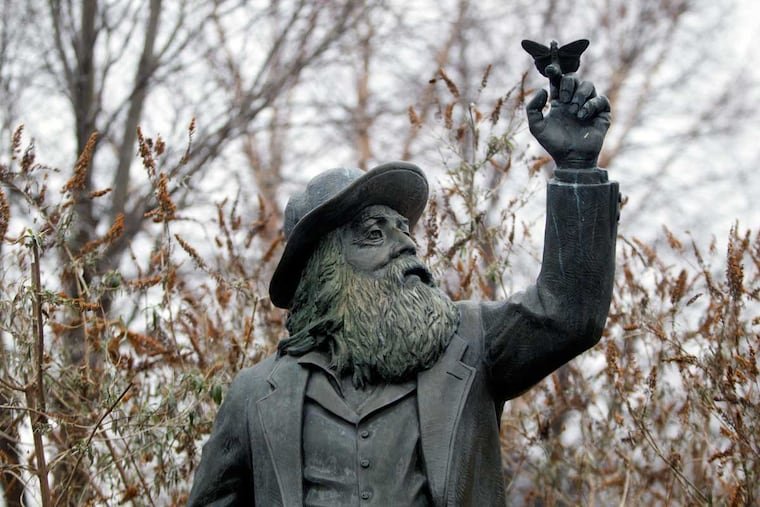Commentary: Walt Whitman, bard of Camden
Centre of equal daughters, equal sons, All, all alike endear'd, grown, ungrown, young or old, Strong, ample, fair, enduring, capable, rich,

Centre of equal daughters, equal sons,
All, all alike endear'd, grown, ungrown, young or old,
Strong, ample, fair, enduring, capable, rich,
Perennial with the Earth, with Freedom, Law and Love
- Walt Whitman, "America"
Poetry fans wishing to mark the 125th anniversary of the passing of Walt Whitman - he died March 26, 1892 - should consider a trip across the Delaware to visit his Camden home.
New York rightly claims him as a native son, as Whitman grew up on Long Island and in Brooklyn. But as is the wont of bards, wanderlust drew him across the country.
At the height of the Civil War, Whitman made it to Washington, D.C., and worked as a nurse, providing cheer and doling out gifts of preserves and tobacco to his "dear comrades."
After the surrender at Appomattox, he clerked for the Attorney General's Office. One of his duties involved interviewing Confederate soldiers for presidential pardons. "There are real characters among them . . . and you know I have a fancy for anything out of the ordinary," he wrote to a friend.
Though Leaves of Grass had first appeared in 1855, Whitman had not yet achieved such widespread popularity that he could support himself by writing alone.
This was not for lack of trying. An unscrupulous self-promoter, Whitman made no bones about ghost-reviewing his own work.
"His scope of life is the amplest of any yet in philosophy," he wrote of himself in an anonymous review. "He is the true spiritualist. He recognizes no annihilation or death or loss of identity. He is the largest lover and sympathizer that has appeared in literature."
Whitman never shied away from the camera, and is considered one of the most photographed individuals of his era. Think Kanye West, but gray-bearded.
Money matters worsened at the beginning of 1873, when Whitman suffered what he called "a whack." (Today's doctors would use an alternative term: a stroke.)
Too ill to work, Whitman left Washington to move into his brother George's house at 431 Stevens St. in Camden.
"Camden was originally an accident, but I shall never be sorry I was left over in Camden," Whitman declared. "It has brought me blessed returns."
The success of the 1881 edition of Leaves of Grass allowed the "good gray poet" to purchase a nearby frame cottage at 328 Mickle St.
It was Whitman's first and only deed.
So unused to sedentary life was the versifier that, while he now owned a home, he barely had anything to put in it. He ate his meals off a packing crate.
In 1885, the old man had an idea.
He invited Mary Oakes Davis, a local widow, to move into his "coop" rent-free if she'd bring her furniture and help the creaky sage.
Whitman described Davis as "my housekeeper, nurse, and friend." Davis considered him "a little off."
"Walt was always a trying person to live with," recounted his brother.
Photographs taken in his bedroom show Whitman nearly swallowed by uneasy columns of manuscripts, letters, and old newspapers. He apparently refused to let Davis empty his bedroom's trashcan.
She also helped keep at bay the neighborhood kids who would gather near the windows, each hoping to catch a coin tossed out by Mickle Street's eccentric.
Davis was as much a public relations manager as housekeeper. While Whitman's poetry danced around that of his contemporaries, the infirm poet himself was more restricted. Davis helped to coordinate the legions of writers who flocked to Camden to meet the bearded bard.
One of these poet pilgrims was a 27-year-old Oscar Wilde, perhaps Whitman's only rival for promotional shamelessness.
The two shared a bottle of elderberry wine, which the satin-breeches-wearing dandy lapped up. "He is a fine large handsome youngster," Whitman said, with "the good sense to take a great fancy to me."
Davis and Whitman remained friends until he passed away in 1892. On his deathbed, she purportedly snipped a lock of hair, now owned by the University of Pennsylvania's Kislak Center.
Whitman designed his own tomb in Camden County's Harleigh Cemetery to resemble William Blake's etching of Death's Door. The estimated cost - $4,000 - is nearly $110,000 in today's money.
Davis, who had worked tirelessly for free for the erratic poet, successfully sued Whitman's estate for lost wages.
Today, Whitman's "coop" is a National Historic Landmark that welcomes visitors from around the world.
Not everyone was lucky enough to have a Mary Davis to care for them in old age. Join HSP on Tuesday for "Women Visionaries and the Care of Older People." Visit hsp.org to register for the free program.
Vincent Fraley is communications manager for the Historical Society of Pennsylvania.